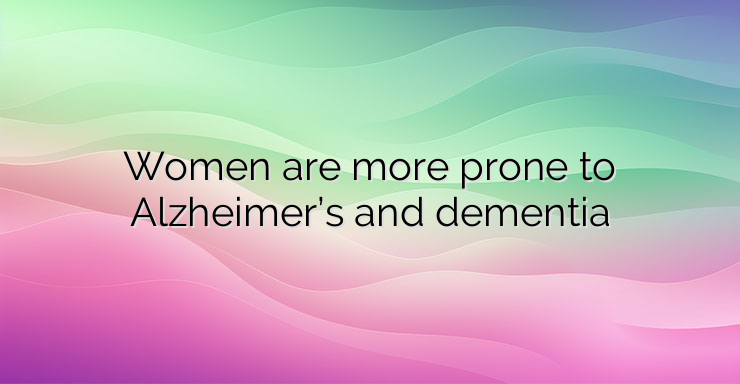Alzheimer’s disease is the most common cause of dementia, characterized by memory loss and cognitive decline. It is a progressive condition that has no cure, but can be temporarily managed with medication. Dementia is a broader term used to describe conditions that occur when the brain begins to malfunction. Memory loss, the ability to make rational decisions, limited social skills are indicative of dementia. The onset of dementia, particularly Alzheimer’s disease, is more common among women. This is confirmed by the World Health Organization, which states that 65% of the total number of deaths due to dementia are in women, and the disability-adjusted life years (DALYs) due to dementia are approximately 60% more in women than in men. Women go through several hormonal changes throughout their lives, including puberty, pregnancy and menopause. These changes can affect the brain and increase the risk of developing Alzheimer’s and dementia. Menopause, in particular, can cause a significant hormonal change that lowers estrogen levels and affects memory and cognitive function. Early menopause may increase the risk of cognitive decline and dementia, while women who have periods at a younger age, have at least one child, and who go through menopause later may have a lower risk. Age is the biggest risk factor for Alzheimer’s disease, and women also live longer than men, increasing the risk of developing the disease. This is partly due to the way the brain changes with age. As we age, the brain’s ability to function declines, and this can lead to problems with memory, thinking, and behavior. There may also be a genetic component to women’s higher risk of dementia. They are more likely to have a family history of Alzheimer’s disease or other dementias, which can increase their risk of developing one. However, lifestyle and environmental factors may also contribute to the increased risk. Women have a higher lifetime risk of stroke than men due to factors such as pregnancy and menopause. Strokes can damage the brain and increase the risk of cognitive decline and dementia. Women who have experienced a stroke should be monitored closely for signs of dementia and receive appropriate treatment and support. In addition, women often experience socioeconomic disadvantage, including lack of education, low income and limited access to healthcare, which hinders their ability to access dementia care when needed – leading to progressive deterioration of the disease. Although there is currently no cure for Alzheimer’s disease, there are steps women can take to reduce their risk.for example, staying physically and mentally active, managing any chronic health condition, eating healthy, getting enough sleep, managing stress, staying socially engaged, and seeking treatment for depression and other psycho-emotional issues. In addition, more research is being conducted to better understand the unique risk factors for women and to develop new treatments and interventions that may help prevent or delay the onset of a serious condition such as Alzheimer’s or dementia. References: Why Women are more at risk for developing Alzheimer’s or dementia? FE – https://www.financialexpress.com/lifestyle/health/why-women-are-more-at-risk-for-developing-alzheimers-or-dementia/3003107/


Leave a Reply